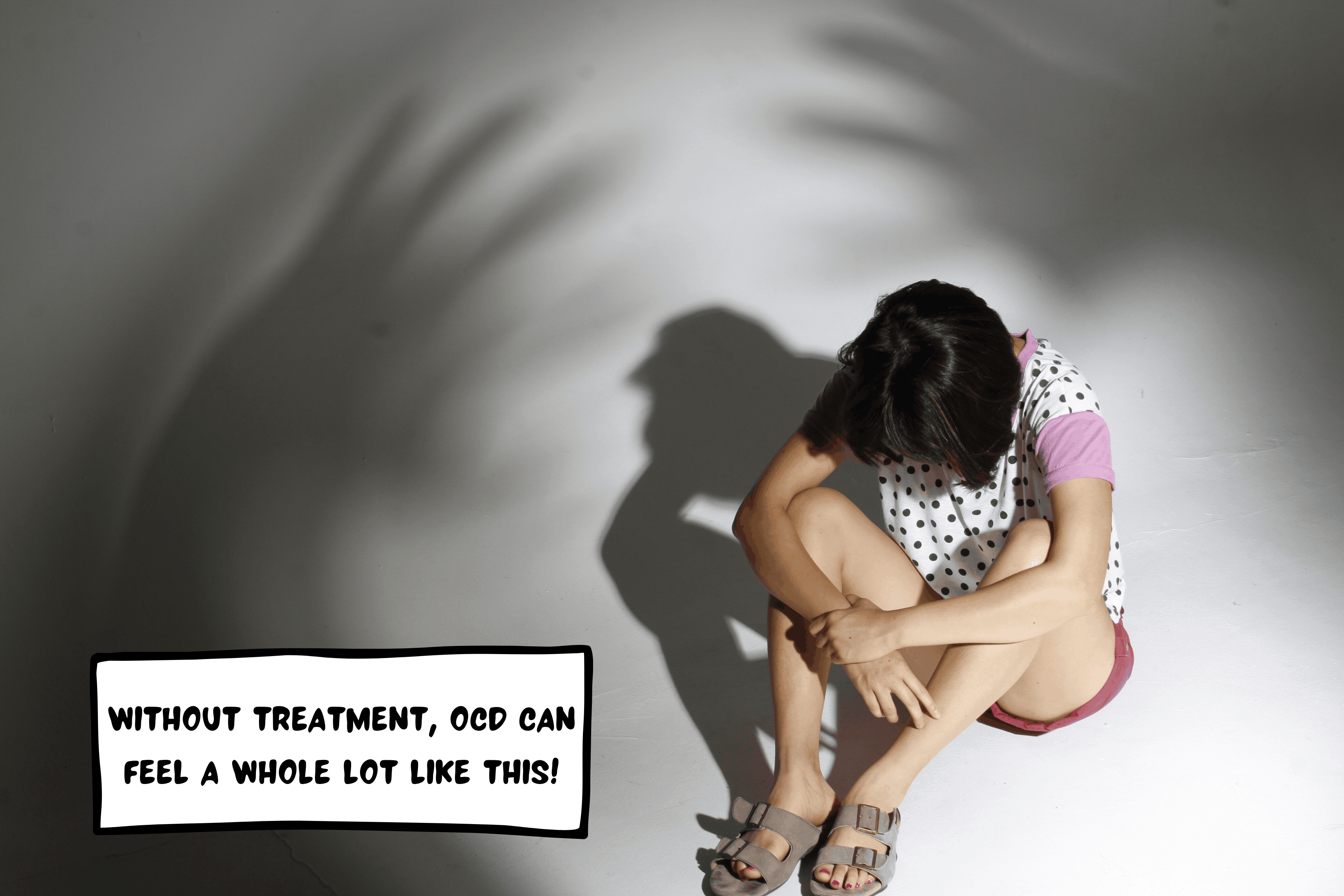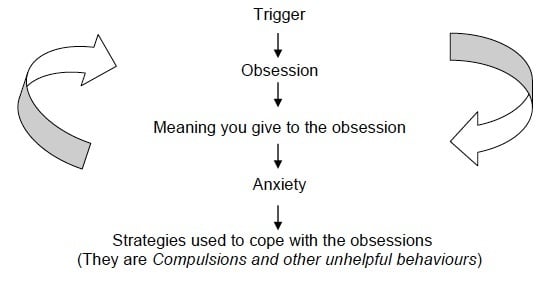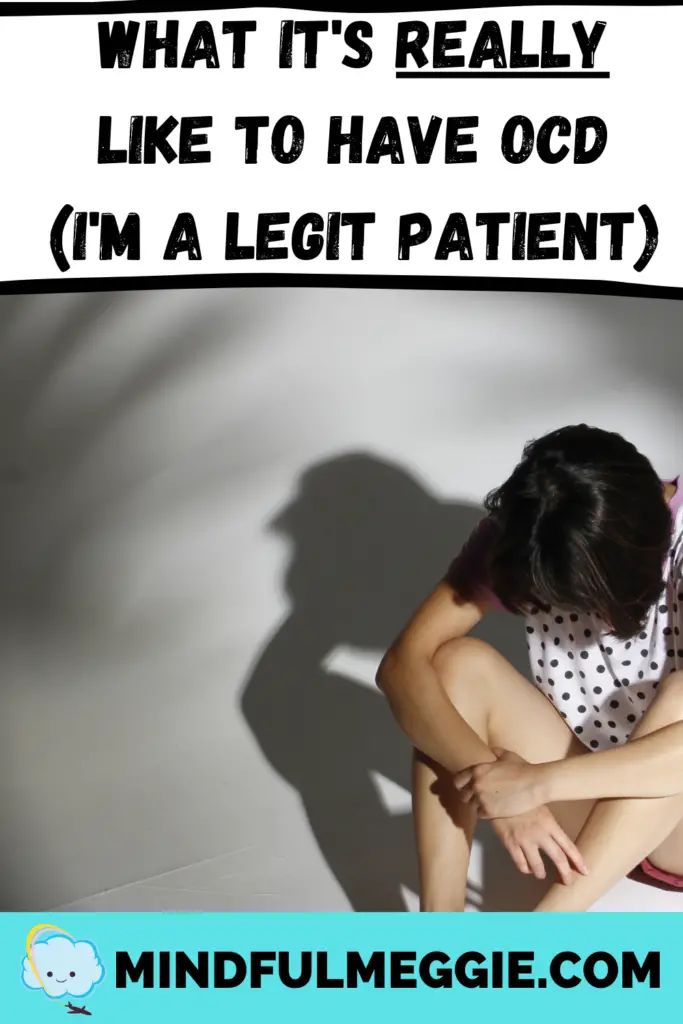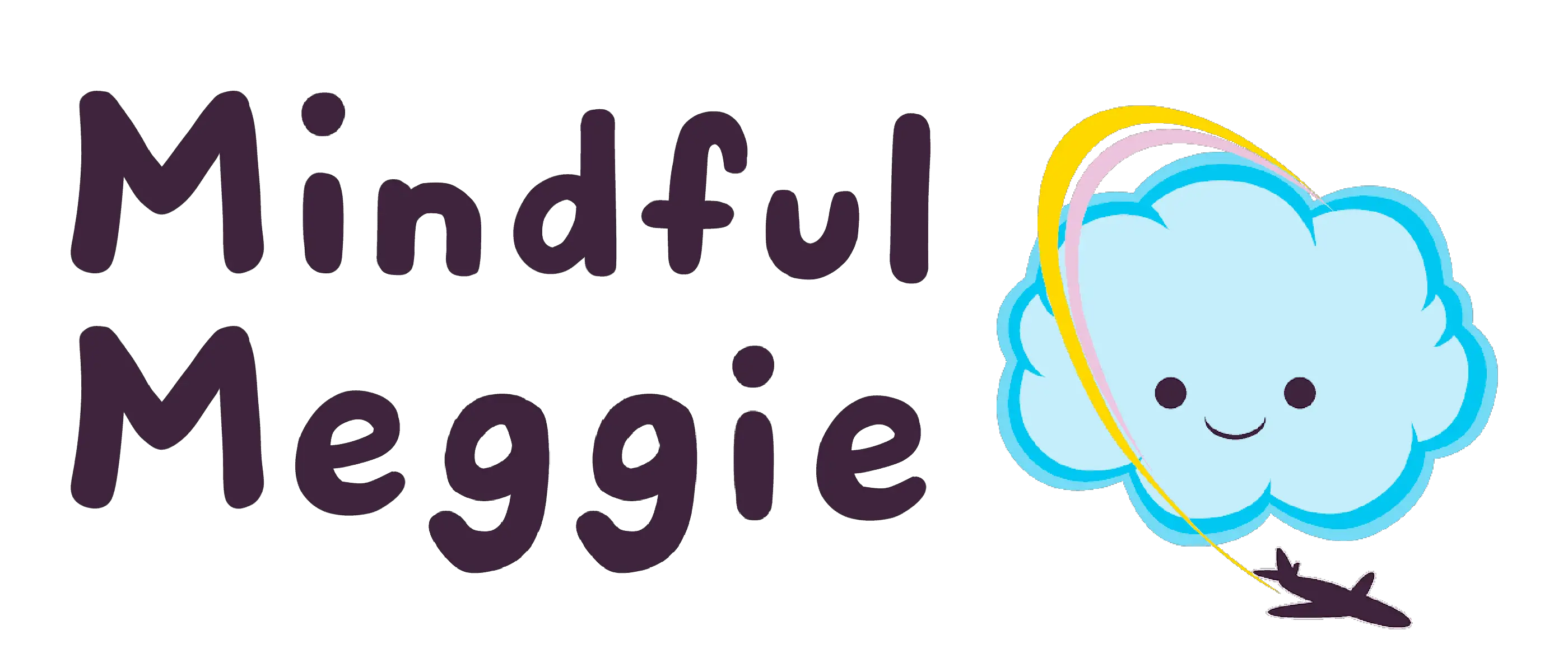
Posted: October 15, 2020
My psychiatrist broke the disheartening news when I was 18 years old…
“Meggie, you have OCD.”
Since then, I’ve learned a whole lot about this common mental illness!
There’s no point in keeping all that information to myself, which is why both you and I are here.
Thank you for wanting to learn more about OCD. After all, many people misunderstand OCD. In reality, it’s serious stuff!
We need knowledgeable allies. We need YOU.
I’ll be imparting my knowledge as clearly as possible, starting with an easy-to-understand analogy.
Table of Contents
The Fake News Analogy
We are all in the age of DISinformation. Troublemakers can post fake news on the internet with ease. Your social media feed may have a little or a lot of fake news.
Imagine if the fake news feed invaded your mind and consciousness.
THAT’S OCD! Scary, right??
Throughout my life, my OCD has delivered a plethora of fake news in my mind.
Now, let’s break down the terms in the acronym.
OCD Defined
O-Obsessive
What first comes to mind when you see the word, “obsessed?”
Maybe you think of a positive fixation. Somebody could be “obsessed” with an epic travel destination, a new show on Netflix, or a new recipe.
“Obsessions” have an entirely different meaning with the mental illness: They are unwanted thoughts occurring in endless cycles. The contents are unsettling, illogical, scary, worrisome, stupid, and/or discouraging. (Yes, I know that’s a lot of adjectives. But that’s OCD for you!)
They bring an onslaught of overwhelming feelings and emotions. As a result, a person with OCD experiences doubt, anxiety, and stress.
Sometimes, a funny feeling lingers in the air that something is wrong even though that “something” isn’t clear.
Back to the fake news analogy… think of obsessions as the contents of fake news.
OCD is just like one big troublemaker who writes and posts fake news… all in my brain! OCD loves to make stuff up and claim them as true. No matter how stupid or ridiculous the content is, it’s always fake.
Fake news stirs attention, making people believe that the content is important.
Likewise, OCD wants me to believe that the fake obsessions are more important than anything else in the moment! More important than finishing a school exam, enjoying my food, being fully immersed in a travel destination, leaving home for an errand, or writing the latest blog post.
Fake news steals attention away from the legitimate news.
Likewise, OCD steals attention away from the real and important things in life. It acts as a relentless distraction that wastes precious time, focus, and energy.
C-Compulsive
Do not get “compulsions” mixed up with the everyday norms of repeated habits. Such behaviors could be cleaning up one’s bedroom, practicing a new language, brushing teeth, and praying. They are a fundamental part of the job, routine, personality, and/or life.
Let’s return to the fake news analogy. Now, imagine seeing a fake news post in your feed. Maybe the content angers you, upsets you. Maybe you start to believe in its cause, its false sense of security. You feel compelled to react with a like, comment, or follow. Hell, maybe you’ll even participate in real life with other followers of that fake content.
The way social media algorithms work, they’ll show you more and more fake content related to that original post. It’s all you’ll ever see!
Wow, look how deep you’ve gotten with the fake news!
“Compulsions” or “rituals,” in terms of OCD, are similar. The more I react to an obsessive thought with a compulsion, the deeper I get.
They are attempts to get rid of the obsessive thought and its onslaught of anxiety. I always feel relief after doing a compulsion.
That relief is so short because the compulsion always backfires against me. Instead of neutralizing the obsession and its anxiety, it STRENGTHS its intensity and persistence. I end up repeating the compulsions with no end in sight. What a tragic waste of time!
The OCD tells me that if I react to the obsessions with a compulsion, I will be safe! The problem is, OCD always promises a FALSE sense of security, which is similar to some online fake news.
Without proper treatment of OCD, I would only stop out of exhaustion and intense stress.
OCD has the most insatiable appetite. Nothing can satisfy it. If I try, I will fail and fall for its trap.
You see, OCD hates uncertainty. It forces me to make sure that everything related to the contents is certain. The problem is, OCD cannot detect certainty, making it impossible to convince OCD to leave the subject matter alone, no matter how many compulsions I try.
D-Disorder (the science behind OCD)
OCD is a mental health disorder. Some of the brain chemistry is not working the way it should.
The scientific side of OCD:
- Nobody knows for sure what exactly causes OCD to manifest in people’s brains!
- We know that the brain with OCD has faulty chemistry regarding the communication of messages. Serotonin is a key neurotransmitter in this process. Think of it as a mail carrier who never feels completely well. It isn’t sufficiently delivering those vital messages.
- Biologically, there is evidence that OCD can be genetically passed down.
- Environmentally, trauma or chronic stress can aid in manifesting OCD.
OCD is a lifelong, chronic mental illness in the brain. You cannot cure OCD. At least you can reduce its impact on life by taking medication, doing behavioral therapy, or both.
The science to back it up shows that nobody chooses to have OCD. OCD acts against one’s will.
Bringing it All Together: OCD as a Cycle
Sometimes, my brain with OCD seems to run a million miles a minute. The thought patterns venture back and forth between the obsession and compulsion/ritual.

- Trigger: Something happens in the external environment. It could be an internal influence in the mind, as well.
The cycle begins. - Obsession: The trigger has caused an unwanted obsessive thought.
- Meaning: The obsession becomes the most important thing on the planet. OCD prioritizes the obsession over everything else currently happening in life.
- Anxiety: If the person can’t tolerate the obsession’s uncertainty, they start feeling anxious and stressed.
- Compulsions: The person performs a compulsion/ritual to try neutralizing the obsession and its anxiety. It never works. It only pushes them deeper into the OCD cycle.
The cycle ends and restarts at the obsession. This second ritual goes by, and then another one, and then another one, until who knows when? For each cycle conducted, the likelihood to repeat piles on. The cycles repeat until the person stops out of exhaustion and intense anxiety.
If OCD is still confusing, in all frankness, I’m sharing my personal examples with you.
Mental Symptoms
OCD has infinite categories and symptoms that can be about anything and everything. They vary from person to person. We still don’t know why.
The following examples are just A FEW of my numerous experiences with OCD.
Most of them are irrational and make no sense. These are the first four examples in the below table.
Others are based on real life, but are stretched to the point of OCD taking over. See the final example.
I’m warning you ahead of time that the much of the content is stupid and weird. Please remember- OCD is a creative writer of fake news.
Personal Examples
| Obsession | Compulsion | Frequency and Current Status of Thought |
|---|---|---|
| Maybe I inadvertently yelled random curse words in public or around my family. People are going to get upset at me and think I am despicable! My reputation might get ruined! Then I might go to jail! | I constantly ruminate to myself that I am not such a careless person. In addition, I monitor my mouth all the time. | Sometimes, as a 15 and 16-year-old. Then, it somehow disappeared. The thought doesn’t come to me anymore. |
| In high school, a boy walks nearby me as I am sitting down at a table. Did he just rape me? | I check my pants zipper to make sure it is closed. I constantly remind myself that nobody pulled down my pants. | Only a few times in high school. The thought doesn’t come to me anymore. |
| I personally hate bleach memes. Sadly, my OCD uses them to make me fear bleach. I ask myself if I accidentally poured bleach into food. Oh no, what if I hurt my family and myself?? | After handling food, I may replay the sequences of events in my head to make sure that bleach was never involved. I may also stare at the food for a few minutes, making sure there’s no bleach in it. I keep my distance from a bleach bottle. I don’t even want to see it! Eventually, I avoid being in the kitchen or nearby the cleaning closet. | Frequently as a teenager. I still fear bleach as of today, though much less than before. |
| My favorite children’s book series must be free of germs. I’m not afraid of getting sick. I just want to keep my books as clean and perfect as possible. | I always wash my hands before touching them to read. As soon as I touch another object, I can no longer touch the books until I wash again. The books must stay in a specific germ-free spot on my bedside table. They cannot be anywhere else. | Frequently, as a 10 and 11-year-old. Then, it somehow disappeared. The thought doesn’t come to me anymore. |
| This one is related to travel! While in Paris, a city of many pickpockets, I constantly worried about my backpack zippers. Did I actually close them? | I check each pocket to ensure they are all closed with a paper clip. I try to limit my rechecking to three times maximum. | Only in Paris (and a little bit in London), August of 2019. I was 19 years old. Only in a city of pickpockets may I get triggered. |
I know, I know. These OCD thoughts are so irrational.
So, let’s stay with reality here. All OCD thoughts are FALSE warnings from the OCD in my brain. For example, I NEVER actually mishandled bleach nor would it ever happen in the future.
I am a virtuous person who would never want to hurt anybody with bleach. I would never be THAT accident-prone, either. Yet, my OCD leaves me doubting myself and my abilities.
OCD gives me a narrative, like, “Am I THAT accident-prone? Did I somehow put bleach in the food I just cooked? Well, I’d better go check the food again in case I did.”
My fear grew to the point that I couldn’t even set foot in the kitchen.
Worst of all, OCD inflicts unnecessary stress, anxiety, doubt, and a lack of confidence and trust in oneself.
For me, low self-esteem is the WORST, MOST PREVALENT SYMPTOM. I’ve been forced to degrade myself for almost as long as I’ve lived.
Low self-esteem is a debilitating symptom all of its own. I’ll have a different post that talks just about it!
Physical Symptoms
Unfortunately, the mental symptoms can lead to physical ones!
OCD can result in symptoms of stress and anxiety. I have had an uneasy stomach, an increased heart rate, and profuse sweat.
The worst are panic attacks! Though they are not dangerous and do not require hospitalization, they feel so scary since they manifest like a heart attack. A pounding head and heart, dizziness, and an inability to stand up properly are some of the painful consequences.
The last time I suffered a panic attack was a few years ago. I hope it never comes back.
These days, my brain simply feels heavier and more tired than normal. After all, the brain with OCD is more active and alert than a brain without. It doesn’t bother me too much, though.
Tic Disorder and Twitches
Some people with OCD may also have a tic disorder, which is somewhat related to Tourette’s syndrome. It involves abrupt twitching movements of the body.
Tics/twitches are a detailed category. To keep things simple, I will use my experience as an example.
Throughout my childhood, my head had undergone twitching spells that I couldn’t prevent. Each time, my head would twitch from side to side for only a second or less. Envision this like you’re standing in cold weather, but only your head is shivering.
For me, it was all involuntary. My body had to physically carry it out. So, I would let it. My twitch was minor and short, so it never interfered with my personal or social life. Thank goodness!
In many cases, the tics and twitches decrease in amount and maybe even stop altogether as one grows older as a teen or adult. At the time of writing, I am in my 20s. Head twitching is so rare that I sometimes forget that I ever had it! Lately, it could happen roughly five times a month.
OCD Changes Over Time
OCD has a dynamic nature!
Symptoms can come and go. Out with the old, in with the new.
One year, I may have obsession/compulsion A. The next year, it may dissipate on its own while a new obsession/compulsion B manifests.
But there are also some symptoms that seem to stay forever; they keep coming back into my consciousness.
Staying on guard for new or different manifestations of OCD is tiring but possible. Sometimes, I do not realize changes straightaway. I may suffer for a period of time before recognizing that it is a result of OCD.
Sigh. “Here we go again,” I tell myself and my OCD.
Who Has OCD?
OCD does not discriminate. It is in millions of people’s brains all over the world, regardless of gender, sexual identity, skin color, race, ethnicity, or any other kind of background.
For every group of 100 adults, one lives with OCD.
For every group of 200 children, one lives with it.
Treatment of OCD
Chronic mental illnesses, such as OCD, can never be completely cured. You can’t just remove them from someone’s brain.
The light of hope for people with OCD is treatment to reduce the intensity and live a freer life. If there’s any luck at all, know that OCD is one of the most treatable mental illnesses.
The most popular treatment is a mix of medication and Cognitive Behavioral Therapy (CBT). While on medication, a patient learns how to wisely cope using CBT.
Some people take only the medication.
Even fewer perform only the CBT.
The different routes to treatment is just a matter of personal preference. However, the CBT is crucial for long-lasting relief.
For me, I took the CBT-only route, which is difficult, but nevertheless helpful!
The specific kind of CBT for patients with OCD is called Exposure and Response Prevention (ERP). This means that I must do everything in my life as normal, even if there’s a trigger waiting to unleash into an OCD thought. For example, I need to go into the kitchen to make my dinner, even if there’s a bottle of bleach nearby.
A quick summary of how I properly cope with an OCD thought:
- When I am triggered by something, an obsession appears. I recognize it for what it truly is… an obsession!
- I remind myself that this thought is the result of a medical illness, called obsessive compulsive disorder. None of it is because of me.
- No matter what my OCD is telling me, I have to consciously change my behavior. Do something else.
- Over time, the OCD loses its value. Performing these steps teaches me that I can survive and thrive without reacting to OCD.
The OCD thought can linger consciously even while I am doing the different behavior. Instead of giving it power by getting myself upset or doing a compulsion, I acknowledge and accept that it’s there. Eventually, it loses its power and fades.
This CBT/ERP method is famous across the community of OCD. It is the brainchild of Dr. Jeffrey M. Schwartz, a renowned psychiatrist at the University of California, Los Angeles (UCLA).
He has a brilliant metaphor to differentiate between people with and without OCD…
People WITHOUT OCD have an automatic transmission of a car. Their gears, their behaviors, shift automatically.
People WITH OCD have a manual transmission. We have to make the conscious effort to change gears, change behaviors. Otherwise, we’d be stuck on the same gear, the same behavior.
***
Dear readers, I hope you better understand this common, yet widely misunderstood, mental illness.
Whether you have a mental illness or not, I hope I serve as an inspiration to persevere in life. The chronic fake news in my brain can stir up anxiety, but I still know better than all that.
It’s all thanks to proper treatment and fulfilling experiences that I can realize my potential to live a fine life. I want to stay true to the badass traveler in my heart. (Believe it or not, my OCD is weaker while I’m traveling.)
No matter what though… my OCD and I. Till death do us part.
Pin to save this post for later, and share it with others!

(Image credit: OCD cycle flowchart from Anxiety Canada).






Thanks for posting your life struggles because I’ve experienced the same struggles with OCD. Your a great help to people with OCD, keep posting and be strong. I’ve had/experienced OCD for over 32 years now. Goodluck
Hello! I appreciate your encouragement. It is because of our community of folks like you and me that I keep writing and advocating for our lived experiences.
I am doing research for a friend who has OCD who doesn’t want to write on the internet. Thanks for your story it helps my friend who has suffered as mentioned in the other post.
You’re welcome! I hope your friend has found my blog helpful.
Hi there….your post is really encouraging for people with OCD like me. I appreciate that you shared your own experiences with OCD in order to help others. Thanks and good luck.
Thank you for your kind words, Molly! 🙂 All the best navigating life with OCD.